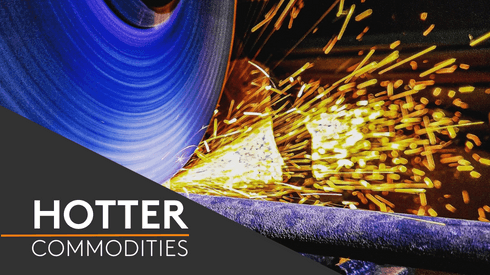Utilities companies and steel mills in China were verbally notified during the Golden Week holiday (October 1-8) to stop importing Australian coal with immediate effect, Fastmarkets reported on October 12. Within days, steel mills in India and southeast Asia reported seeing more spot cargoes of Australian coking coal being offered to blast furnace-based steel mills.
Soon after the verbal notice was released, Australian coking coal prices across the board declined in the spot market. On October 9, Fastmarkets’ premium hard coking coal, fob DBCT index stood at $132.82 per tonne. But the index dropped to $104.40 per tonne by November 13. On December 4, the index stood at $102.62 per tonne.
End users from ex-China markets, such as those in Europe and India, took advantage of the relatively low Australian premium hard coking coal prices and purchased spot cargoes.
Recently some Australian miners were offering premium low-vol hard coking coal at the same price as premium mid-vol hard coking coal or even at lower prices to Indian buyers. A coke producer source from India said premium mid-vol hard coking coal suits blast furnaces there better.
Chinese domestic coking coal prices have been on an uptrend since the ban in early October, so has been the case for Mongolian coking coal prices. Moreover, Canada and US-origin premium hard coking coal, as alternatives to Australian premium hard coking coal, in China enjoyed a premium in the cfr spot market.
An end in sight?
Most Chinese market participants link the ban to the souring political relationship between the two nations and hold a pessimistic view of the ban being removed.
“I don’t see the ban being lifted any time soon. Given the souring relations between China and Australia, I wouldn’t be surprised if it isn’t eased in the first quarter or even the first half of 2021,” a trader source said.
“Although Australia has premium hard coking coal at a lower price compared with its Chinese domestic counterparts, China still has alternatives,” a coke producer source in China said.
“Firstly, China mainly relies on domestic coking coal, and only around 10% comes from abroad. Secondly, steel mills can turn to countries other than Australia for coking coal. For instance, some steel mills bought premium hard coking coal from Canada and the US at higher prices. Thirdly, most steel mills can adjust their coal blend ratio gradually to cope with the lack of Australian coking coal,” the same producer source added.
“Unless the tensions between China and Australia ease, the ban won’t be lifted. No one knows when we can resume imports of Australian coking coal,” a steel mill source from east China said.
Meanwhile, sources from ex-China markets held slightly differing views.
One steel mill source based in East Asia said there is still hope the China-Australia relationship can improve. After US President-elect Joe Biden’s inauguration on January 20 next year, the United States is likely to show some goodwill gestures to China and Australia may follow suit, the mill source said.
A Singapore-based trader source was also positive: “China will resume imports of Australian coking coal in the first quarter of next year because China needs high-quality coking coal.”
But a coke producer source in India did not think China will lift its ban on Australian coal in the first quarter of 2021 and expects the tensions to continue.
And a trader source from India refused to make speculations. “If China doesn’t import Australian coking coal next year, the fob market will remain subdued. Indian steel mills mainly import Australian coking coal via term contracts, and they only buy now and then in the spot market,” he said.
Fastmarkets steel raw materials senior analyst Miriam Falk shared her view at the Virtual Coaltrans 2020 conference in late November and elaborated on her reasoning this week.
“Though the tensions are still high, the situation is unlikely to stay unchanged until the end of next year. We have no forecast of exactly when it will be lifted, but one option is that authorities may momentarily treat thermal and coking coals differently, by for example making temporary allowances for imports of coking coal because it’s hard for Chinese mills to find equivalent high-quality premium coking coals from elsewhere and there’s now increasing congestion at the ports in north China with vessels loaded with mostly coking coal,” Falk said.
“In the end, the ban will start to have an impact on the margins for Chinese mills, which are already weak. So that’s something the authorities will also have to weigh in when deciding how long they want to impose the import ban.”
With the majority of market participants not expecting the ban to be lifted in the very short term, sources shared their views on how suppliers and consumers will react to this new demand dynamic.
“The demand and supply of coking coal globally is relatively fixed. If the ban continued, Canada and the US can export more of their spot volumes to China, while end users in ex-China markets can import more from Australia. Thus there is a new state of balance,” an Australian trader source said.
“The current scenario is harmful to both Chinese end users and Australian miners, while it benefits parties such as miners from the US and Canada, who have been selling premium hard coking coal materials to China at a high price recently,” the source added.
“The truth is that two countries are co-dependent – we’ve got have the largest exporter on the doorstep of the world’s largest consumer so finding a replacement is more a long-term objective rather than a short-term option for China,” Falk concluded.



